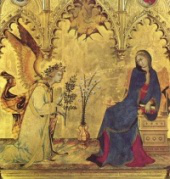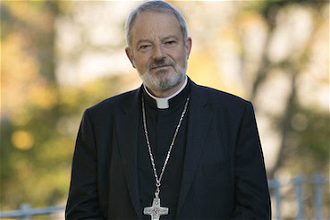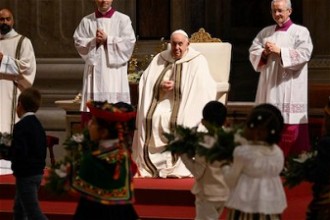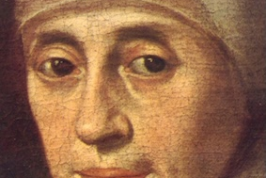The Great 'O' Antiphons: Christmas Eve - O Virgo Virginum

Annunciation - Simone Martini
O Virgo Virginum: The extra ‘O” !
A Thought for the Vigil of the Nativity
O Virgin of virgins how shall this be?
For neither before you was there any like you, nor shall there be after.
Daughters of Jerusalem why do you marvel at me? The thing you behold is a divine mystery.
The traditional seven ‘O’ Antiphons of the last week of Advent are a journey with the Prophet Isaiah and others, telling the story of the coming of the Christ from Creation to Bethlehem. For us in the Northern Hemisphere it is also a transition in two ways, firstly in liturgical terms from the glimmer of light as life began, to the rising of the Sun that never sets. It also comes at that point when the year turns, the darkest shortest day and longest night, the winter solstice takes place during this week. We have yet to face deep winter but the light is coming, alongside the cold days to come, a flash of sunlit hope appears.
That then is our journey of the seven antiphons, but there were others. They came later and appear as part of the rich varied tapestry of developments fitting for one age, but perhaps not the next. One such extra O still remains in two living liturgical traditions. Unlike the more ancient seven, this one ‘O Virgo Virginum’ is all about Mary, the Mother of Jesus, she who conceived by the power of the Holy Spirit.
This antiphon has no connection with Isaiah, instead the words take the form of a short dialogue between Mary and the women of Jerusalem. This has echoes both of the poetic interplay between the daughters of Jerusalem and the woman in the Song of Songs and the Crucifixion narrative in Luke 23.28 where the women of Jerusalem are told by Jesus not to weep for him!
Nobody is certain when it was introduced, possibly by Amalarius of Metz in the 9th Century. Because England had a profound devotion to Mother of God by Anglo Saxon times, it is unsurprising that this ‘O’ was found in several English liturgical rites; Hereford, York and Sarum where it occurred on the 23rd December, O Sapientia then being moved to the 16th! The other rite in which it occurs is that of the Premonstratensian Order of Canons Regular, founded in 1120 by St Norbert, who early on developed a particular devotion to the Virgin Mary .
Whatever its history it seems a fitting way in which we come before that raw but profound moment of mystery and wonder, with Mary as she gives birth to her first born, Jesus! All we can do is let go of our questions and problems, placing our hopes, needs and wishes with her at the side of Christ, trusting in the power of intercession beyond all words. Her song, which always accompanies these antiphons sums up our prayers on the eve of the Nativity: ‘For the Mighty One has done great things for me-holy is his name. His mercy extends to those who fear him, from generation to generation’.( Lk 1.49)
Fr Robin Gibbons is an Eastern Rite Chaplain for the Melkite Greek Catholics in Britain.

















